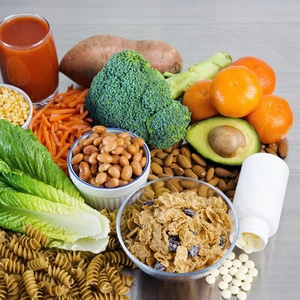
The most common cause of anaemia is the lack of iron in your diet. This is, however, not the only nutrient important for the production of red blood cells.
Folic acid is the synthetic version of the water-soluble vitamin folate, a B-vitamin (B9). Foods are often “fortified” with folic acid because in its natural state, folate doesn’t do well when it comes to food storage and preparation, according to Dr Robin Foroutan, spokesperson for the Academy of Nutrition and Dietetics, and Integrative Dietitian at The Morrison Centre.
Folic acid is responsible for a wide array of bodily functions, including cell division; DNA synthesis; detoxification and hormone balance; neurotransmitters; mood and mental health; cell membrane health and the myelination of nerve cells.
How does lack of folic acid cause anaemia?
According to John Hopkins Medicine, low levels of folic acid can cause megaloblastic anaemia (sometimes also referred to as folate-deficiency anaemia). This type of anaemia occurs when the red blood cells are larger and fewer than they should be. These abnormally enlarged cells are also not round, but oval shaped. They don’t tend to last as long as normal red blood cells and don’t perform a good job of carrying oxygen through the body.
Does it differ from iron-deficiency anaemia?
This type of anaemia develops slowly and may not show symptoms for several years. When symptoms finally do show, they're similar to iron-deficiency anaemia (fatigue, shortness of breath, dizziness, irregular heartbeat and a pale skin). The main difference, however, is that megaloblastic anaemia can also cause digestive issues such as diarrhoea and nausea. A sore, reddened tongue also occurs in some people.
Since folic acid is so important in DNA structure, the genetic material found in your cells can become compromised, hence the abnormal growth of red blood cells.
Are you at risk for folic-deficiency anaemia?
There are several reasons why your level of folic acid might be low:
- You don’t eat enough foods containing folate. It can be found in leafy green vegetables (think folic = foliage), fresh fruit and vegetables, nutritional yeast, fortified cereals and meat.
- You drink too much alcohol. Chronic excessive use of alcohol can lead to the malabsorption of many crucial nutrients, including folic acid.
- You have a pre-existing condition of the digestive tract, such as coeliac disease, which may also hinder the absorption of folic acid.
- You are pregnant and the developing baby depletes you of folic acid.
- You take certain medications that may hinder the absorption of folate. These medications include some birth control medications, cholesterol-lowering medications, anticonvulsants for seizures and methotextrate, a medication used to treat certain cancers, rheumatoid arthritis and psoriasis.
What to do if you suspect folate deficiency anaemia
If you suspect that you might suffer from anaemia-related symptoms and your folic acid levels may be low because of the above reasons, it’s important to seek medical care, as a blood test will confirm the condition. If you have an underlying digestive issue that may cause your body not to absorb folate as it should, additional examinations may be done.
Your doctor will then determine the best cause of action, which could be a change in lifestyle and diet, a supplement, medicine, or treating an underlying condition such as a digestive issue.
Before your doctor’s visit, it’s important to know what medication you are taking, or whether you are suffering from a condition that could lead to folate deficiency anaemia.
Maintain healthy folic acid levels
Most people are able to get adequate folic acid from the food they eat. Be sure to include plenty of leafy greens; fresh fruit (especially oranges); whole grains; lean red and white meat; legumes; and nuts in your diet. If you are vegan, up your intake of whole grains or fortified cereals.
Image credit: iStock




 Publications
Publications
 Partners
Partners















